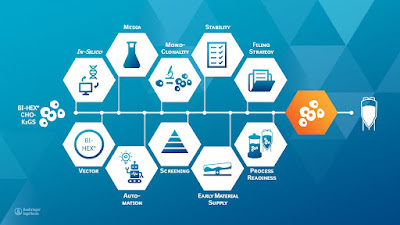 |
| Cell Line Development |
Cell lines have revolutionized scientific research and are being widely used in the creation of artificial tissues (e.g., artificial skin), a study of gene function, antibody production, testing drug metabolism and cytotoxicity, vaccine production, and synthesis of biological compounds e.g., therapeutic proteins. Cell line development is a major step for examining the efficiency of drug discovery, toxicity, and in vitro testing. It minimizes time, cost, and effort, which reduces the likelihood of research drugs failing in the clinical trial phase.
Cell line development requires the discovery of single cell-derived clones that produce high and consistent levels of the target therapeutic protein. Cell lines are usually clonal, meaning that the entire population originated from a single common ancestor cell. Clonal cell lines are derived from the mitotic division of a single cell seeded in a sterile microtiter plate by limiting dilution, as used in the cloning of hybridoma cell lines. The development of immunotherapy for the treatment of cancer is the major application of cell line development.
Thus, with the increasing prevalence of cancer across the globe, the demand for cell line or cell line development is also increasing at a rapid pace. For example, according to the American Cancer Society, in 2021, there will be an estimated 1.9 million new cancer cases diagnosed and 608,570 cancer deaths in the United States. Cell lines derived from cancer cells are frequently used in cancer research to study the biology of cancer and to test cancer treatments, which in turn helps to speed up the drug discovery process.
This comment has been removed by the author.
ReplyDeleteNice article Cell line development Indeed Plays an Important Role in Drug Discovery/Development Process. Companies like Aragen has vast experience in delivering clinical stage and royalty-free commercial research cell banks (RCBs).
ReplyDeletePharmacokinetics
DMPK
Discovery solution